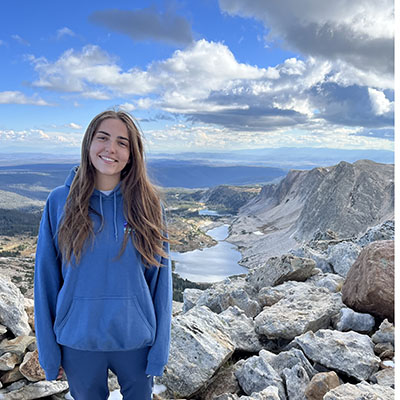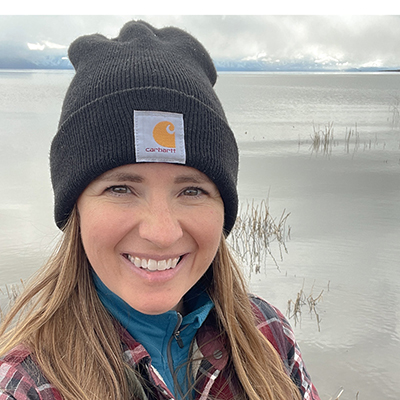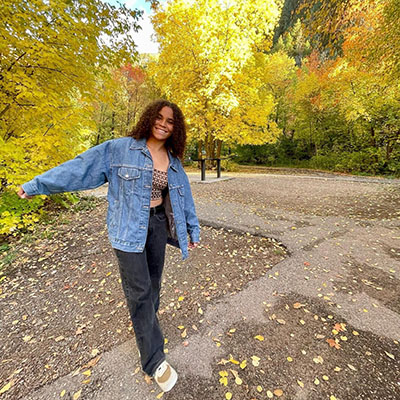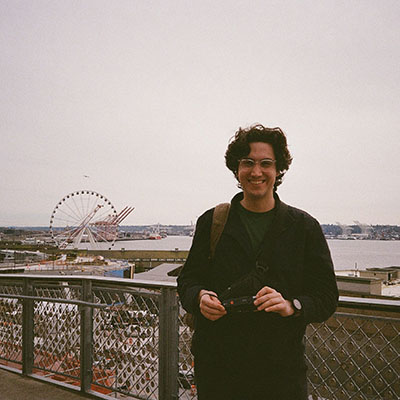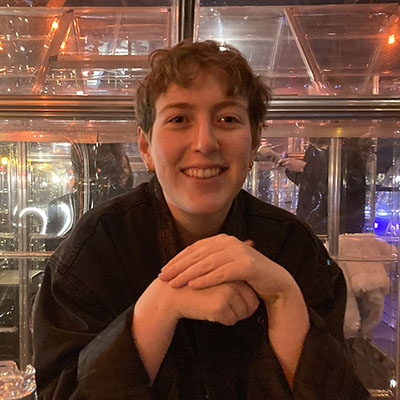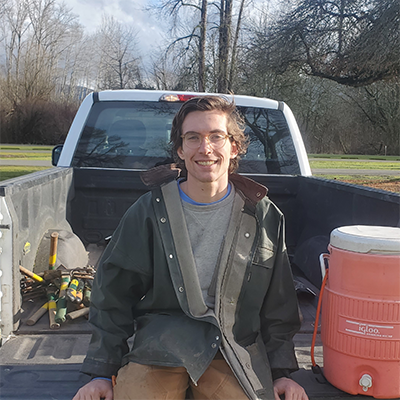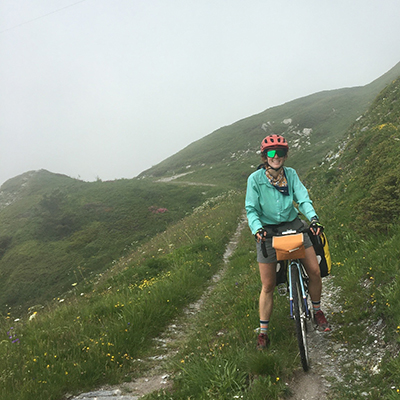Abigail Graham
I completed my undergraduate degree at the University of Wyoming with a double major in American studies and environmental and natural resources. These two-degree programs helped me develop an interdisciplinary perspective and, more importantly, gave me an up-close view of the intersection of nature and culture. The research projects, coursework, readings, and field studies that comprised these programs kindled my interest in environmental humanities.
My thesis, Downwind Downriver, is a creative nonfiction exploration of two environmental crises unfolding across
Utah’s landscape: the legacy of nuclear fallout from tests conducted at the Nevada
Test Site between 1952 and 1992, and the toxic dust and public health consequences
emerging from the desiccation of the Great Salt Lake. By placing these histories in
parallel, I examine how human negligence and policy decisions have shaped both ecological
collapse and lived experience. This project seeks to reframe nuclear fallout not as
a closed chapter of Cold War history, but as a persistent and present-day crisis.
Likewise, I aim to situate the drying of the Great Salt Lake not as an isolated event,
but as the beginning of a
longer environmental unraveling - one that will live on in a similar fashion to the
legacy of nuclear fallout.
Teri Harman
As a second year EH student, my research focuses on reparative place-making and communication as restoration for Utah Lake. About fifty miles south of the more well-known Great Salt Lake, Utah Lake has been a vital freshwater oasis for the last 14,000 years. However, starting in the mid-1800s following Mormon settlement, the lake suffered several forms of serious environmental degradation. River diversions, toxic dumping, introduced species, pump stations, and more altered the hydrology and ecology, and, also, the community relationship to this central waterbody.
Now, surrounded by more than 700,000 people, Utah Lake is actively healing thanks to hundreds of restoration projects started in the 1980s. Sadly, the dominant discourse rarely acknowledges the new-normal and instead stubbornly repeats the low-point conditions of the 1970s. This phenomenon prevents connection, encounter, and, sometimes, important conservation initiatives. My EH project aims to provide a counter-discourse for Utah Lake—a sense-making guide that directly addresses the historical conditions, stalled narrative, current conditions, and possibilities for the future.
My related work for Utah Lake includes being co-curator of Healing Waters: Restoring Our Relationship with Utah Lake, on display at the UVU Museum of Art until September 27, 2025. I’m also volunteer director of public outreach for a local nonprofit, Conserve Utah Valley. Last year, I presented at the Utah Academy of Sciences, Arts, and Letters conference and the University of Utah Practicing History Conference. Over the summer I was an artist-in-residence for the Taft-Nicholson Center. During fall 2025, I will present at UVU’s Earth Science Seminar, BYU’s Environmental Stewardship Symposium, and The Water Commons Symposium for the Tanner Humanities Center at the University of Utah, which I also helped organize. My essays have been published by Torrey House Press and Edge Effects magazine.
I live near the shores of Utah Lake in Saratoga Springs, Utah, with my partner and three children.
Baylie Jackson
I grew up in Sacramento, California and learned from an early age to love the mountains, the beach and all of the gorgeous nature Northern California has to offer. I pursued my undergraduate studies here at the University of Utah, where I earned a bachelor's of science in Environmental and Sustainability Studies with an emphasis in Conservation and Land Management, alongside a minor in Anthropology. I was initially drawn to the University of Utah at the young age of 15 for its athletics as I committed to play soccer here, but what truly won me over was the campus’s amazing location nestled within the Wasatch Front. I am incredibly grateful to continue my education in such a remarkable environment.
From my undergrad into postgrad I have honed in on energy justice as my main area of interest. The transition to renewable energy systems is paramount in our fight to mitigate climate change, yet access to these technologies is distributed inequitably across economic and social lines. My research specifically focuses on carrying out a sociotechnical analysis of household solar access within both Utah and California. I will be looking at Salt Lake City County in Utah and Sacramento County in California. Through policy analysis and interviews with various stakeholders within the household solar field, I plan to investigate how policy, society and economics affect the accessibility of household solar energy. I will be working upon a foundation of energy democracy and just transition, to truly peer into the current energy transition taking place, finding what factors inhibit a transition to renewable sources and what factors may help promote it. My hope is to overall understand the major variations within the solar energy landscape between two wildly different states, and understand what factors may be the most important to allowing more households to tap into the energy grid on their own through solar.
Outside of school, I enjoy staying active by playing sports, hiking, snowboarding, and anything and everything having to do with water. I'm a huge sports fan and attend as many different Utah games and competitions as I can. Overall, I love spending time with my people and being outdoors, which is why I have loved being able to study in Utah.
David James
I grew up in Boise, Idaho, on the contemporary, ancestral, and unceded land of the Shoshone, Bannock, and Northern Paiute people. I left Idaho to complete my BA in comparative literature at Reed College. After my undergraduate studies, I taught English at a primary school in Requena, Spain. Before joining the Environmental Humanities program, I worked for several years as a permit administrator for the Bureau of Parks and Recreation in Portland, OR. During my time with the Parks Bureau, I organized with the City of Portland Professional Workers Union.
Currently, in my studies I seek to understand the cultural and social significance of orchids at and after the turn of the 20th century. I hope to tell their story through a critical analysis, largely brought to bear through queer, feminist, and anticolonial theory. How will such critical frames tell the story of how ‘the orchid’ is manufactured? The task that question calls for means understanding the figure of the orchid as it makes its appearance in botany, historical archives, and culture such as in the work of Oscar Wilde, H.G. Wells, Emmeline Pankhurst, and Georges Bataille.
My interests include but are not limited to the politics of aesthetics, ecocinema, environmental media & media studies, environmental history, pedagogy, literature, labor history, intellectual history, and amateurism as an act of love.
Abby Laskey (they/them)
I attended the University of Utah to study Kinesiology and Parks, Recreation, and Tourism for my undergraduate degrees and fell in love with the area surrounding us here. This area entails the unceded ancestral and contemporary homelands of the Ute, Goshute, Shoshone, and Paiute peoples.
After graduation, I worked with a variety of organizations centered on environmental education and stewardship, outdoor recreation, and anti-colonialism. I entered Environmental Humanities with the goal of furthering work in those fields and drawing connections between them. With the generous support of the Mellon Foundation, I have pursued community engagement in my graduate studies, working closely with the Nature Center at Pia Okwai (NCPO) to assess the impact and potential of nonprofits in environmental conservation and placemaking. My work is guided by the principles and values of environmental justice and community-based research. My research centers marginalized voices and people and my work has been led by community input in a collaborative process. Determining what “community” means as it applies to community building in community-based research and community-based nonprofits has been a critical process in this research.
Outside of school, I enjoy reading, crafting, and exploring our backyard valley and mountains on foot, by bike, on skis, and however else I’m able.
/photo: Mara Scallon
Evan Mahler (they/them)
Evan Mahler (they/them) I’m from San Diego, California, and I graduated from Pomona College in 2020 with a degree in English. The EH program has allowed me to formally engage in the research I found myself doing informally for the last several years. For my thesis project, I am developing an immersive theatre performance based on the life and afterlives of John Wesley Powell to be staged in the Environmental Humanities house, an original 19th-century building on the Fort Douglas campus. I am interested in the ways that stories are reconstructed over time and how these stories mold popular perceptions of land, space, and region.
Some of my other interests include nature documentaries, the gelato place near my apartment, Indian food, layover days on backpacking trips, walking my dog in Liberty park, alpine lakes, planning other peoples’ trips, taking my e-bike up hills, samples at the farmers market, used bookstores, queer community in SLC, topographic maps, doodling, throwing small foods in the air and catching them in my mouth, and showing new people the ropes.
Cait Quirk
I arrived at the EH Program after living in Seattle, where I completed my undergraduate degree in International Relations and worked as a mountaineering instructor and policy researcher. During my time in and after undergrad, I worked with a Kichwa community in the Andes on sustainable agriculture projects, and continue to return to Ecuador. These are two of the places that have most shaped me as a person, and which have prompted my curiosity surrounding socio-environmental restoration, land relations, and political ecologies of climate change.
In both Washington and Ecuador, I witnessed the impacts of increased glacial melt to community livelihoods, water sources, recreation, riparian habitat, and cultural customs. Now, I study these glaciers, asking: how do we relate to melting landscapes? Specifically, I am tracing the meltwater of the Deming glacier on Koma Kulshan (Mt. Baker) and its effects on the Nooksack River Basin. In the summer of 2025, I conducted field work with the North Cascades Glacier Climate Project as a part of a longitudinal glaciology study. Finally, I am producing a film photography and poetry collection surrounding glacial melt as a personal form of relationality. By employing embodied, scientific, and creative approaches, my project is an interdisciplinary study of North Cascades glaciers and what they mean to community members.
When not writing my thesis, you can find me in the alpine.
Jack Rouse
I grew up in Richardson, Texas, located in the Blackland Prairie ecoregion called home by the Wichita, Caddo, Comanche, Cherokee, Kickapoo, and other Indigenous Peoples. I attended the University of Texas at Austin for my undergraduate studies where I completed a BA in English and a BBA in Accounting. During my time in Austin, I led an ecological restoration project to establish a pocket Blackland prairie on campus—the Little Blue Prairie—and organized to diversify the university’s public art collection. After graduation, I worked on ecological restoration crews and as a gardener on the West coast.
For my research, I run the Japantown Oral History project with my community partner, Utah Japantown Advocates. This collection of interviews preserves the vital social life of Salt Lake City’s Japanese American community while serving as a forum for imagining a revitalized Japantown. My thesis analyzes how community oral history projects function as a rhetorical practice in the field. I receive support for this project from the American West Center through the Floyd O’Neil Fellowship.
In my free time, I enjoy teaching WRTG 2010, biking or running around the city, catching a movie with Salt Lake Film Society, and paying attention to plants.
Mara Scallon
I received my B.S. in Environmental Science from Northeastern University, where I was a leader in the DivestNU fossil fuel divestment movement.
I’ve worked variously as a renewable energy developer, science communicator, bike tour guide, wild blueberry researcher, and in a variety of service industry jobs. I am keen to continue exploring Utah and the region through academic, recreation, and artistic lenses, especially watercolors and film photography.
My thesis explores how people connect to place and develop place identity and attachment to place even as they are constantly moving through the landscape; I am using bikepacking as both subject and method to explore this phenomenon and build on earlier, similar research done into walking, hiking, and canoeing. I am interested in understanding how the twin regimes of capitalism and colonialism influence the physical and cultural sides of recreation (including bikepacking) and hope my work can assist in obviating and redressing the harms caused by these systems as part of the work towards replacing these systems.
Additional research interests include the processes of cultural adaptation by agricultural communities to the realities of climate change, the geographies of toxic waste, and how cultures render visible phenomena unseen. My research interests, reading, and learning continue to be challenged and shaped by the many varied interests and experiences of my communities in Environmental Humanities, Utah, and the broader world.
River Schumann
I am a researcher and writer working at the intersections of Black feminist theory, queer of color critique, and mad studies. My work develops methods for thinking with and through the psychic, ecological, and bodily dimensions of unlivable time. I examine how archives, commemorative practices, and institutional demands for self-disclosure shape the conditions under which Black life is made to appear, disappear, and become legible, often in ways that reproduce harm rather than repair it.
Drawing on and extending the work of Saidiya Hartman, Katherine McKittrick, and Christina Sharpe, I employ critical fabulation, wake work, and autotheoretical writing to interrogate the recursive harms of archival capture and the demands for legibility placed upon the Black body. Throughout my thesis, I explore how the dead, the disappeared, and the living are compelled to testify under conditions that deny them rest, resolution, or recovery, and how such demands reverberate across both history and the present.
My research is committed to methodological experimentation—melding archival critique, personal narrative, and theoretical inquiry—to map the nonlinear temporalities and affective intensities that trouble and exceed dominant narratives of resistance, survival, and closure in Black life. I write across boundaries of discipline, form, and genre, building scholarship that is as rigorous as it is vulnerable, and always attentive to both intellectual and embodied stakes.
Jachelle Araiza
My passion for sustainability and environmental justice has been shaped by a lifetime of diverse experiences. Raised in a single-parent household by my mother, a 20-year U.S. Army veteran, I moved frequently before age 18, living in O‘ahu, Los Angeles, Seattle, Washington, D.C., Daegu, and El Paso—each place deepening my understanding of cultural and ecological systems.
On O‘ahu, I was raised in the spirit of Aloha and connection to the land, while in Los Angeles, my family’s Mexican-Indigenous practices of herbal medicine taught me to value diverse knowledge systems. Experiences in the Pacific Northwest, D.C., South Korea, and El Paso exposed me to watershed dynamics, urban water issues, agricultural communities, and binational environmental challenges.
I earned my B.S. in Marine Science–Biology with a minor in Environmental Science at the University of Tampa, where I participated in niche ecology research with mangrove trees and algae populations. This fostered a new mindset of how the smallest of organisms in the food chain make the biggest differences.
After 18 months of volunteer service in the U.S. South and Canada—where I learned
French, taught English, and supported community programs—I discovered my passion for
teaching. Later, as an educator with KUPU in Hawai‘i, I taught environmental science
and Hawaiian cultural practices to the low-income communities of West O’ahu. These
experiences have shaped the trajectory of my career. I believe that investing in the
education of future generations is one of the most powerful long-term strategies for
addressing environmental challenges. My graduate project will focus on integrating
Traditional Ecological Knowledge into U.S. environmental education, empowering students
to become sustainability-minded decision-makers.
Having just moved from O’ahu, some of my pastimes include lei making, dancing, singing,
free-diving, traveling abroad, and watching baseball with my family! Winter pastimes
I enjoy include snowboarding, ice skating, sledding, and stargazing at a campfire
with Salted Caramel Hot Chocolate.
Emma Duggleby
Originally from the unceded lands of the Shoshone, Goshute, Paiute, and Ute peoples (Salt Lake City), I received a BA from Scripps College (think more liberal arts, less fish) in Media Studies and Environmental Analysis. Before returning to SLC, I had the opportunity to explore these fields outside of an academic context first as an intern at DC’s National Gallery of Art then as an environmental educator in Seattle. Throughout both roles, I grew increasingly focused not only on communicating environmental issues themselves, but also on prompting more in depth sustainable, connected thinking.
Through the EH program, I am looking to bridge these academic and on the ground experiences. Broadly interested in centering how media (technological and material) represent, communicate, and connect to deserts in the American Southwest and Utah, I am especially informed by Environmental Justice principles and an ethos of entanglement, care, and multiplicity. I am excited to think through questions of how physical and day-to-day interactions with place are mediated and the roles environmental communication can play.
Beyond class, I love exploring old/new media and technologies, ephemera, coffee shops, foresty deserty nature, digital art, music, video games, and comfy cozy places to read.
/photo: Jachelle Araiza
Ruby Gary
I was born and raised in the heart of New York City, but at the end of each school year, my family would pack up our minivan and drive to the Rockies, which both of my parents call home. The summer months I spent wandering through the Wasatch Front, the Teton Range, and the Flathead Valley cemented in me a deep awe for alpine landscapes. I earned a B.A. in Comparative Literature and Public Health at Williams College, where my central line of inquiry emerged around questions of psychopathology on both individual and systemic levels. During the summers, I worked as an outdoor educator in Adirondack State Park, and outside of class, I managed a campus-wide farm-to-table lunch series, where I found immense joy connecting with local farmers and chopping up pounds of seasonal produce with my peers.
Since graduating, I have followed intersecting lines of inquiry into human well-being, and ecological, political, and identity-based relationships to land: as a farm apprentice in the Hudson Valley, a Teaching Fellow at an outdoor boarding middle school in the heart of Adirondack Park, and, most recently, as a case manager at a refugee resettlement agency in New York City.
I begin my studies in the Environmental Humanities program pursuing similar questions of community health and identity as they relate to land and climate change. My research interests include displacement, the psychological effects of climate change, and the intersection of human health, community sovereignty, and environmental health.
I’m thrilled and moved to be out West, closer to my extended family and beginning to form my own roots in a place so formative to my childhood. I’m looking forward to continuing to romp around the mountains, to learn and grow beside my inspiring cohort, and to build up my sea-level lungs!
Maya Gomez-Coultas
I grew up in Massachusetts where I spent my childhood between the woods of Maine and Boston’s urban sprawl. For my undergraduate degree, I attended the University of St. Andrews in Scotland. There, I studied Geography, with my degree culminating in a dissertation using GIS and remote sensing to research ‘vulnerability’ due to mining in Appalachia. At St. Andrews I found a home in a sustainability organization, running a food co-op and gardening with my friends. I left my degree passionate about neither physical geography nor human but the space in-between. Since graduating the University of St. Andrews, I have worked in conservation and outdoor education in the national forests of New Hampshire and then Montana. Most recently, I worked as a research fellow for the Forest Service investigating the history of timber product surveying.
Drawing on my work in extractivism in my undergraduate degree, I come to the environmental humanities program with questions on the relationship between systems, culture and epistemologies and our natural resource management. My research interests include decoloniality, Marxist ecologies, environmental sacrifice zones, rural studies and corn ethanol.
Outside the classroom, I aspire to become a quilter, a trail runner, and someone who can sit still. When not conversing with my friends, I love to dance, swim, explore and work on my tree identification.
Ian Hanesworth
I was raised in the Mississippi River Valley, on a small farm in the Driftless Area of southeastern Minnesota where my family tended flocks of sheep, alpaca, chickens, and bees. As a child, abundant creative energy manifested in the building of tree forts and rearrangement of creek beds. I went on to pursue a BFA in Fine Arts Studio at the Minneapolis College of Art & Design. After graduating in 2018, I was awarded several grants, participated in solo and group exhibitions, and attended artist residency programs around the country. My creative practice engages in critical thinking about environmental topics through printmaking, textiles, writing, and community workshops.
During the last summer of my undergraduate degree, I started working at an urban vegetable farm and found myself immediately captivated by the endless subtleties of tending soil and growing food. Farming allowed me to work directly with plants, gain a better understanding of local food systems, and deepen my relationship to land. I have now worked more than seven seasons on organic vegetable and flower farms, tending a variety of annual and perennial crops on operations of different scales. I chose to step away from farming for the time being to pursue research interests in another part of the food system: hunting. I am particularly interested in examining the ways hunting can help build relationships between humans, landscapes, and the species we kill for food. This interest comes from a deep personal entanglement with food that stems back to a childhood foraging for mushrooms and hunting wild game with my father in Minnesota.
In my free time I enjoy trail running with my pup, foraging for wild food and medicine, sitting in cold creeks, cooking overly elaborate meals, and cross country skiing.
Rachel Kunselman
I grew up outside of Philadelphia, Pennsylvania, where I completed my undergraduate degree in Education from the Pennsylvania State University. A common thread through my teaching and the projects that I created has been raising awareness of the human impacts on and relations with the environment. To further my interests, I began building connections within local nonprofit groups in Utah, which led me to an internship as a Grassroots Organizer with the Southern Utah Wilderness Alliance. As a Grassroots Organizer, I advocated within the community to build support for the preservation of land against extractive industries in Utah. These lands include the unceded ancestral and contemporary homelands of the Ute, Goshute, Shoshone, Dine, and Paiute peoples. It was through this experience that I began asking questions about land management issues throughout the West.
I am starting my journey in the Environmental Humanities program, with a curiosity
and lens toward indigenous sovereignty, decolonialism, and indigenous ecologies as
a form of resistance and environmental justice in the Anthropocene. Through the Mellon
Foundation, I am grateful to have the opportunity to build connections and engage
with community-based organizations that are working toward these values.
Outside of school, I enjoy reading, hiking and camping with my dog, and exploring
the deep and winding canyons of the desert.
/photo: Jachelle Araiza
Rikki Longino
I grew up in the temperate rainforests of the Pacific Northwest and the cloud forests of Costa Rica. My parents were rainforest biologists and I was steeped in biological science, ecospiritual quakerism, long hikes, rice and beans, and grunge music from a young age. I have always been awe-struck by wild nature and the persistence of life in the face of adversity. In high school I became interested in food justice, herbalism, and seed-sovereignty. I worked on small-scale farms in North and South America, studied Permaculture design, and received my BS in Urban Ecology at the University of Utah in 2016. I started The Mobile Moon Co-op, a femme and queer led botanical collective and was invited to the EH program as the first Community Practitioner in Residence in 2021. Four years later I have come to the EH program again as a student in order to advance my work and research on local food and seed networks.
I currently work at The Salt Lake City Public Library as the garden and seed library coordinator and help run The Mobile Moon Co-op farm; a small queer community space in West Valley City. With the generous support of the Mellon Foundation, I intend to research and enhance networks of adaptive resilience in the region via Indigenous self-determination and community seed saving. By providing strong, viable seed to return to Ute, Shoshone, and Goshute tribal members as well as Salt Lake City’s vibrant gardening community, I aim to initiate a radically renewed lineage of collaborative survival.
Matt Williams
Hey there! My name is Matt and I’m passionate about wild places and what they can teach us about ourselves. After graduating with a degree in anthropology and economics, I spent five years teaching high school biology and working in the private sector. When I wasn’t at a desk pushing buttons, I was outside skiing, biking, running, and camping.
Eventually I realized that the recipe for a good life is quality time with people, in beautiful places, doing things that fulfill you mentally and physically. So, I finally made my ten-year-old self proud and traded my suit and tie for a sun shirt and sandals. After a few years as a backcountry guide with Holiday River Expeditions, I was itching to get back into the academic world, and the Environmental Humanities program presented to perfect opportunity to study what I love with a focus on staying engaged with the outdoor recreation community and working towards social change.
My research interests include the rights of nature movement, water in the west, and the interplay between outdoor recreation and preservation. In addition to my coursework, I teach undergraduate writing & rhetoric, make art on a blog called Pancake Morality, and play almost every day in the Wasatch mountains.


